Reasoning Questions : Syllogism Set 1
1.Statements:
All banks are shops.
Some houses are shops.
Some houses are miracles.
Conclusions:
I.Some miracles are shops is a possibility.
II.Some banks are houses is a possibility.Statements:
1 : If only conclusion I follows.
2 : If only conclusions II follows.
3 : If either conclusion I or II follows.
4 : If neither conclusion I nor II follows.
5 : If both conclusion I and II follow.
[su_accordion]
2.Statements:
Some cups are not bolts.
All dusters are balls.
All cups are balls.
Conclusions:
I.All bolts are cups.
II.Some dusters are cups is a possibility. Statements :
1 : If only conclusion I follows.
2 : If only conclusions II follows.
3 : If either conclusion I or II follows.
4 : If neither conclusion I nor II follows.
5 : If both conclusion I and II follow.
[su_accordion]
3.Statements:
All clocks are rocks.
No calendar is a mock.
Some clocks are calendars.
Conclusions:
I.No clock is a mock.
II.Some rocks are clocks
1 : If only conclusion I follows.
2 : If only conclusions II follows.
3 : If either conclusion I or II follows.
4 : If neither conclusion I nor II follows.
5 : If both conclusion I and II follow.
4.Statements:
No leopard is a cheetah.
Some cheetahs are tigers.
All tigers are lions.
Conclusions:
I.Some leopards are not tigers.
II.All leopards are tigers.
1 : If only conclusion I follows.
2 : If only conclusions II follows.
3 : If either conclusion I or II follows.
4 : If neither conclusion I nor II follows.
5 : If both conclusion I and II follow.
5.Statements:
All Greeks are Romans.
Some Romans are Tandas.
Some Gangus are Tandas.
Conclusions:
I. Some Romans are Tandas.
II. All Greeks are Gangus.
1 : If only conclusion I follows.
2 : If only conclusions II follows.
3 : If either conclusion I or II follows.
4 : If neither conclusion I nor II follows.
5 : If both conclusion I and II follow.
[su_accordion]
6.Statements:
Some people are buyers.
No buyer is market.
Some markets are not malls.
Conclusions:
I.All markets being people is a possibility.
II.No market is people.
1 : if only I follows.
2 : if only II follows.
3 : if either I or II follows.
4 : if neither I nor II follows.
5 : if both I and II follow.
[su_accordion]
7.Statements:
Some people are buyers.
No buyer is market.
Some markets are not malls.
Conclusions:
I.Some malls are buyers.
II.Some buyers are not malls.
1 : if only I follows.
2 : if only II follows.
3 : if either I or II follows.
4 : if neither I nor II follows.
5 : if both I and II follow.
[su_accordion]
8.Statements:
All squares are circles.
All circles are units.
No circle is a meter.
Conclusions:
I.Some units which are not circles can be meters.
II.Some squares being meters is a possibility.
1 : if only I follows.
2 : if only II follows.
3 : if either I or II follows.
4 : if neither I nor II follows.
5 : if both I and II follow.
[su_accordion]
9.Statements:
Some songs are not tunes.
All tunes are drums.
Some tunes are sticks.
Conclusions:
I.All sticks are drums.
II.No stick being drum is not a possibility.
1 : if only I follows.
2 : if only II follows.
3 : if either I or II follows.
4 : if neither I nor II follows.
5 : if both I and II follow.
[su_accordion]
10.Statements:
Some songs are not tunes.
All tunes are drums.
Some tunes are sticks.
Conclusions:
I.Some drums being songs is a possibility.
II.All those drums which are tunes can be songs.
1 : if only I follows.
2 : if only II follows.
3 : if either I or II follows.
4 : if neither I nor II follows.
5 : if both I and II follow.
[su_accordion]
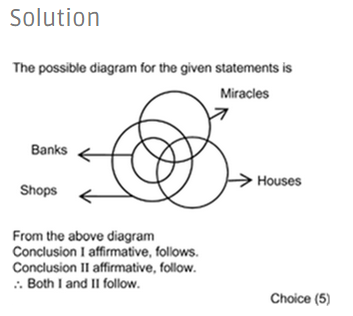
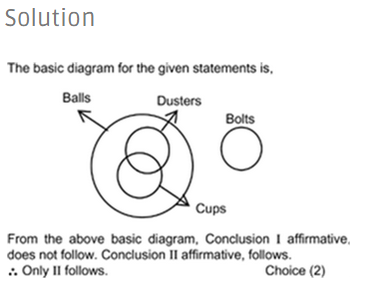
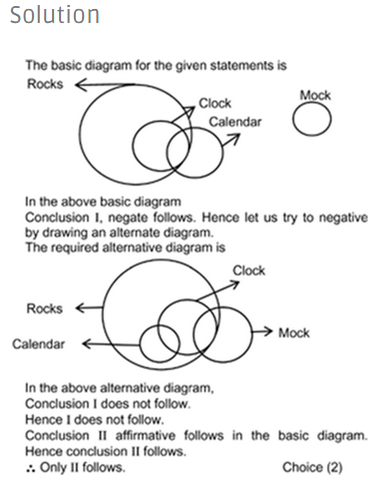

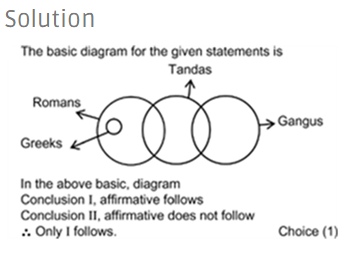 1 : If only conclusion I follows.
1 : If only conclusion I follows.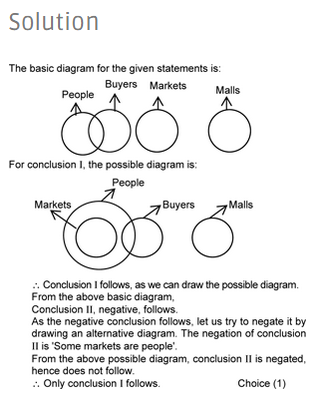 1 : if only I follows.
1 : if only I follows.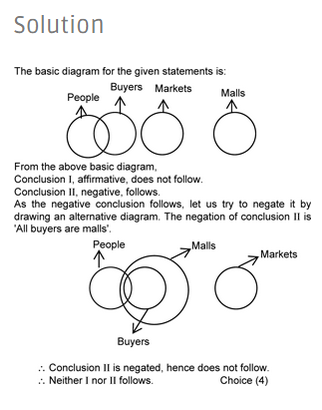 4 : if neither I nor II follows.
4 : if neither I nor II follows. 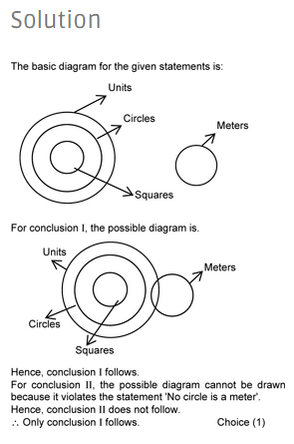 1 : if only I follows
1 : if only I follows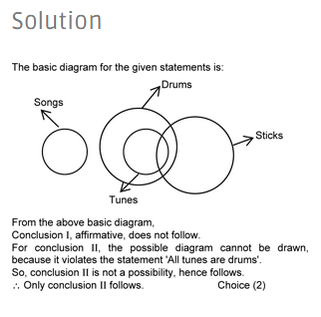 2 : if only II follows.
2 : if only II follows.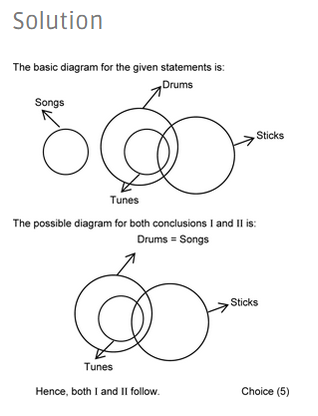 5 : if both I and II follow.
5 : if both I and II follow.
No comments:
Post a Comment